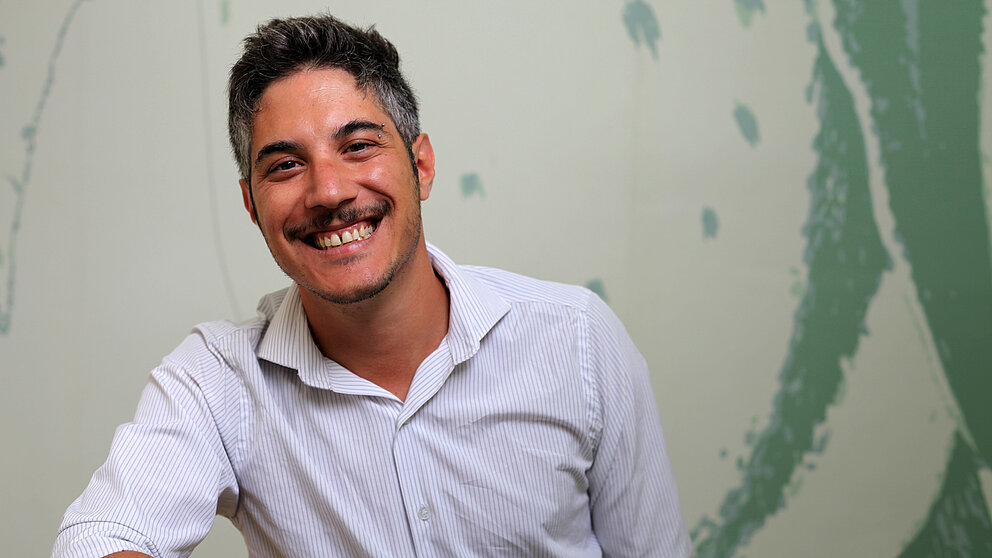
Apart from his research, there is one thing the Argentinian historian Walter Ludovico Koppmann from the University of Buenos Aires sees in front of him nearly every day: the gleaming golden building of the Philharmonie, which he often visits after work. It reminds him of his grandmother who was a concert pianist right up to her 92nd year. “As long as I have my laptop and a beaker of mate to hand, I can work anywhere. I particularly like being in the State Library – in amongst all the books and students and with the view of this special city.” Since September 2022, Koppmann has been a Georg Forster Research Fellow working with Professor Stefan Rinke in the department devoted to the history of the Lateinamerika-Institut at FU Berlin.

Apply now!
Walter Ludovico Koppmann came to Germany with a Georg Forster Research Fellowship. Apply now for a fellowship for postdocs and experienced researchers who contribute to sustainable development!
Preserving Jewish history
His topic is the development of the Jewish working class, the worlds of work and left-wing political cultures in the Buenos Aires of the early twentieth century. In 1914, the city was home to the largest Jewish community in Latin America. Many Jews had fled Russia, were looked upon as “foreigners” in Argentina and experienced discrimination. During the so-called Semana Trágica (tragic week) in 1919, when a labour dispute was suppressed at the cost of 800 lives, there was also a pogrom in the Jewish quarter of Buenos Aires. “This piece of Argentinian history has not yet been adequately explored. It is important to me to preserve the memory of the Jewish workers. They themselves had no opportunity to document their times, I want my work to make up for that.”
All over the world Koppmann finds rare primary sources such as trades union newspapers, has them translated from Yiddish, analyses them and puts the perspectives of Jewish workers into an historical context. For him it is also an archaeological task – one that has a direct link both to his own family history and to the present day. His grandmother had Jewish roots and fled the Tsarist Empire in 1915, firstly to the United States, then to Argentina. With a view to the present day, Koppmann says, “We are living in turbulent times in which extreme right-wing political movements are gaining power worldwide, and intolerance, xenophobia and violence are spreading. I want to highlight the mistakes of the past so that we can hopefully learn from them.”
We are living in turbulent times in which extreme right-wing political movements are gaining power worldwide, and intolerance, xenophobia and violence are spreading. I want to highlight the mistakes of the past so that we can hopefully learn from them.
Since he was a child, Koppmann accompanied his mother – who is also a social scientist – to various congresses andconferences, generating a keen sense of social problems and an inner drive to find solutions to them. He studied the works of Karl Marx in detail and found his way into political activism. “For me, organised social movements are the key to change and a better world. We can empower them by using our research and theories to provide them with thinking tools.”
And there is another thing Koppmann believes is crucial: “We must act collectively, listen to each other more and give young people economic and political decision-making power.” In his understanding, this means new social criteria are called for – with regard to diversity and gender but also business and climate change. “Humanity cannot go on as it has been in the last decade.”
In science, too, Koppmann believes in the power of cooperation and communication. Sharing information, telling one another about fellowships or giving advice when requested, all that is part of his research ethic. “This is the only way science can continue developing and become more diverse.”
To work at the distinguished Lateinamerika-Institut, to meet excellent researchers from all over the world and to build a network of one’s own – all this enables me to continue developing my career at a very high level. And then in this amazing city.
Koppmann is concerned about the research landscape in Argentina. The country is in crisis and science has reached a turning point. Whilst the number of tenured research positions tended to increase in the last ten years, working conditions deteriorated. Ever fewer people want to work in research, according to Koppmann. “We have a saying, ‘In Argentina, science is done on two dollars.’ We only have a bit of funding or none at all.” The situation is exacerbated by the plans of the future president Javier Milei. In order to curb the crisis, he wants to privatise academia and completely abolish state support.
A career dream fulfilled
The opportunities the Humboldt Fellowship offers Koppmann mean a great deal to him. “To work at the distinguished Lateinamerika-Institut, to meet excellent researchers from all over the world and to build a network of one’s own – all this enables me to continue developing my career at a very high level. And then in this amazing city,” says Koppmann. He visited Berlin as a tourist in 2019. A tour guide told him about the good conditions offered by Humboldt Fellowships. “At the time, this seemed a million miles away. Two years later, I applied and when I was accepted, a dream was fulfilled.”
Koppmann now feels quite at home in Berlin. In his shared house there is a piano – he has been playing since he was seven – and last winter he went to a concert with the Argentinian pianist Martha Argerich in the Philharmonie. “This research stay isn’t only the peak of my career so far; it is also connecting me to my family roots.” Koppmann’s grandfather was born in Austro-Hungary. “Learning and talking German gives me the feeling of returning to my forebears.”
Author: Esther Sambale
